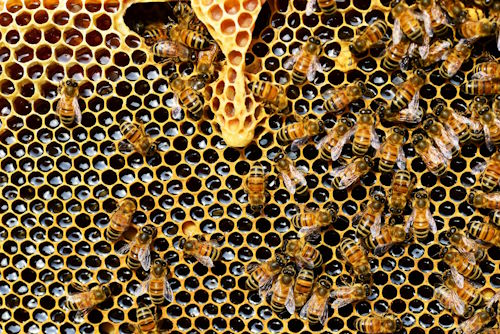Honey has long been used as a home remedy for everything from healing burns to settling an upset stomach.
But there’s limited evidence that honey can counteract the effects of pollen, a powdery substance released by plants in the spring and fall.
Can Honey Desensitize You to Pollen?
BREAKING: Cleanse Your Body With a Simple Natural Pill
The idea that honey might combat allergy symptoms starts with the notion that gradual exposure to small amounts of an allergen will gradually lead someone to build a tolerance.
Because bees use pollen to make honey, some people believe that by eating raw (minimally processed) local honey, they are exposing themselves to trace doses of pollen from nearby plants, and thereby desensitizing themselves to pollen in the air.
The concept is basically that of immunotherapy, which is how allergy shots work, according to Gerald Lee, MD, an associate professor in the section of allergy and immunology at Emory University School of Medicine in Atlanta. “With allergy shots, we are modifying the immune system, exposing the body to allergens so the body no longer reacts to them,” Dr. Lee explains.
“Honey, unfortunately, is not going to do that, even if it’s local or raw,” he says.
First off, honey does not contain much, if any, of the pollen linked to seasonal allergies. Honey bees carry pollen produced by flowers; the pollens responsible for most allergies come from trees, grasses, and weeds.
“Very little of the common pollen allergens would make it into honey,” says Melanie Carver, the chief mission officer with the Asthma and Allergy Foundation of America. “And if they did, they might trigger an allergic reaction in someone who is allergic to that pollen.”
Honey and Allergies: What Research Says
Few studies have explored honey and allergies, and those have been small and yielded mixed results.
A trial involving 40 patients with allergic rhinitis (characterized by sneezing, runny nose, and itchy eyes) in Malaysia divided participants into two groups. Both groups received antihistamine treatment, while one of the groups also got a daily dose of honey.
After four weeks, researchers noted that those in the honey group had a significant improvement of all allergy symptoms.
A study conducted by scientists at the University of Connecticut divided 36 patients with seasonal allergies into three groups — one receiving locally collected, unpasteurized, unfiltered honey; a second receiving nationally collected, filtered, and pasteurized honey; and a third receiving a corn syrup placebo. Neither honey group experienced symptom relief that was any different from the placebo group.
A review published in 2023 of existing medical literature on this topic concluded that honey was an ineffective treatment for seasonal allergies.
Numerous professional medical groups, including Cleveland Clinic, say that honey is not a proven remedy for seasonal allergies and shouldn’t be considered a first-line defense.
Honey May Relieve Cough
Honey may provide some relief for one allergy-related symptom, according to Lee. He points to a research analysis showing that honey reduced the duration and severity of cough caused by upper respiratory tract infections.
“Honey can soothe the cough reflex center in the back of your throat, and potentially could alleviate cough from allergy,” says Lee. “It wouldn’t eliminate the root cause — it would just be symptomatic treatment.”
If you do use honey for cough, pasteurized honey may be a better choice than raw options. “Pasteurization helps processed honey last longer,” Carver says. “Pasteurizing prevents fermentation and delays granulation. The process also kills some bacteria.”
Does Honey Have General Health Benefits?
Although research has not generally supported honey as an allergy remedy, studies have shown that it has potential medicinal properties with antibacterial, anti-inflammatory, antifungal, antiviral, and antidiabetic effects.
Some evidence indicates that honeys like manuka (from a plant native to New Zealand and parts of Australia) and tualang (a Malaysian multifloral jungle honey) may have a higher concentration of bioactive compounds than other honeys and provide more health benefits.
Allergy Treatments That Work
The Asthma and Allergy Foundation of America highlights allergy treatments that have proven to be helpful when it comes to seasonal allergies:
- Nasal rinse: A saline (saltwater) nose rinse can cut down mucus and rinse allergens out of your nose. Remember to use these as directed. If making your own saline solution, use distilled water.
- Nose sprays: Corticosteroid nose sprays are the most effective treatment for allergic rhinitis symptoms and have few side effects. They treat swelling and inflammation in your nose. Antihistamine nasal sprays are also effective options.
- Eye drops: Allergy eye drops can be helpful in managing eye allergy symptoms. They can relieve burning sensation, itchiness, redness, increased tearing, and swelling.
- Antihistamines: Antihistamines can relieve sneezing and itching in the nose and eyes. They also reduce a runny nose and, to a lesser extent, nasal stuffiness. Look for a long-acting, nondrowsy antihistamine.
- Decongestants: To a lesser extent, decongestants may be helpful. They shrink the lining of the nasal passages and relieve stuffiness. But they should be used for only a short time (usually three days or less). Check with your doctor before using decongestants if you have high blood pressure, glaucoma, thyroid disease, or trouble urinating.
- Immunotherapy: In the form of allergy shots or under-the-tongue tablets, immunotherapy is designed to achieve desensitization and contain controlled amounts of a specific allergen. An allergist injects you with increasing amounts as your body adjusts, observing you for symptoms. Allergy shots are quite effective at improving seasonal allergy symptoms.
TRENDING: New Formula Visibly Firms Skin And Hydrates Better Than an Expensive Cream
The Takeaway
- While some people believe local honey can help with allergies by desensitizing a person to pollen, there's limited scientific evidence to support this claim.
- Honey may help with allergy-related cough.
- Research has shown honey to have some medicinal benefits, including anti-inflammatory properties.








